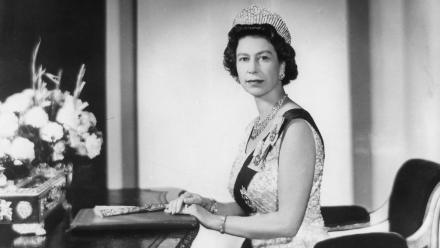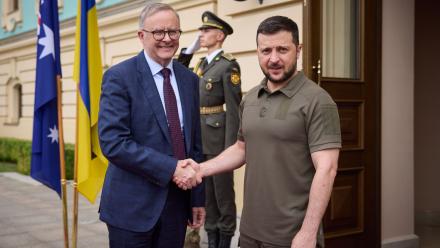Why ANU has decided to cut ties with Russia
Like the rest of Australia, staff and students at the Australian National University have watched with horror Russia's completely unjustified invasion of Ukraine.
The ANU has decided to suspend all links with institutions in Russia, indefinitely and with immediate effect.
The university strongly condemns Russia's invasion of Ukraine and its fundamental breaches of international law and the UN Charter, on which the rules-based international order is founded. Russia's invasion of Ukraine threatens the peace, freedom and democracy on which freedom of inquiry and academic collaboration is based.
We stand in solidarity with the Ukrainian people in their defence of sovereignty and freedom and offer our support for the universities of Ukraine.
We identify with those brave Russian academics and students who oppose the Putin government's unprovoked aggression.
The ANU acknowledges that this is a very difficult time for our Ukrainian staff and students and for those who have family members, friends and colleagues in Ukraine. We commit to support all those in our community whose lives are affected by this aggression.
Our decision is not one we have taken lightly, as we recognise the significance of scientific and cultural exchange for international peace, cooperation and academic freedom.
However, we believe cutting ties with Russia now is the right thing to do. So do an increasing number of universities around the world, for the following reasons.
First, it is important to recognise the historical magnitude of the conflict in Ukraine. President Putin has not just invaded, but also openly denied the legitimacy of Ukraine's existence as an independent state. Russia is threatening Finland and Sweden with war, should they now also seek to join NATO.
Comparisons between what we are seeing in Europe today and Czechoslovakia in 1938, or Poland in 1939, are not easily dismissed. This is how world wars begin.
Second, we are humbled by the realisation that we-as individuals and collectively-could and should have foreseen the challenges facing Ukraine and the international community today. Ever since Russia's war with Georgia in 2008, there have been many voices in the international community who have warned of the dangers in Putin's Russia. The international community, including ANU, continued its cooperation with Russia even as it first attacked Ukraine in 2014.
Third, we are in lockstep with and inspired by the widespread measures, taken by governments and civil society across the world, to cut ties with Russia in the financial, economic, investment, trade and transport, cultural and sporting spheres.
Putin can only act as he does because he is enabled by active and passive complicity across large parts of Russia's state and society.
If we are to avoid further bloodshed and destruction on a catastrophic scale, we must collectively demonstrate to the Russian people the consequences of what Putin's government is doing in their name.
Our decision may not be much, indeed it seems tragically insufficient, but given the dangers of an ever-escalating conflict, it is what we can and should do now.
When the history books are written about 2022 and the years that led to it, they will have chapters on sins of commission. But the chapters on the sins of omission - how the world let this happen - will be even longer.
The immediate material effects of our stance will be small. We do not inflict harm, merely disappointment, inconvenience and, we hope, a degree of shame. But we will add to the global pressure on the Russian people to consider individual and collective responsibility for what is happening in their name.
Fourth, we fear that the worst of this conflict is ahead. Russia's invasion so far was inept in many regards, and based on poor political and operational assumptions. But Russia's army remains large and powerful, and will adapt. Russia has yet to use much of the devastating firepower of its artillery and air force.
So if we do not cut ties now, then when? After the toll of dead, wounded and displaced reaches some greater obscenity? After all Ukraine's cities lie in ruins? After Russia escalates the war by attacking further neighbours? Or never, because what will be the point when it is too late?
We are conscious that we could look at the question of whether a university should react to international conflict in terms of scientific ideals not being soiled by political consideration. We could debate it in a utilitarian way about Australia supporting Europe so that it in turn might support us against security risks in the future. Or we could look narrowly through the prism of material consequences.
No doubt debates along those same lines were had in the 1930s in many countries and institutions. But in the end, the only thing that people remember, and the only thing that really mattered, was who stood on the right side of history, and who did not.
At ANU, we are confident that the right side of history is to stand with the people of Ukraine, and against Russia's blatant aggression, and encourage institutions of all types across Australia to join us.
Professor Brian Schmidt AC FAA FRS is Vice-Chancellor and President; Professor Joan Leach is Chair of the Academic Board; Professor Sally Wheeler OBE MRIA FAcSS FAAL is Deputy Vice-Chancellor for International Strategy and Dean of the College of Law; Professor Stephan Fruehling is acting Head of the Strategic and Defence Studies Centre; Anne McNaughton is Director of the Centre for European Studies; and Professor Rory Medcalf is Head of the National Security College, all at the Australian National University.
This article first appeared on The Sydney Morning Herald.
Read the University's statement on Ukraine here. Read FAQs about the University's stance on Russia here.


